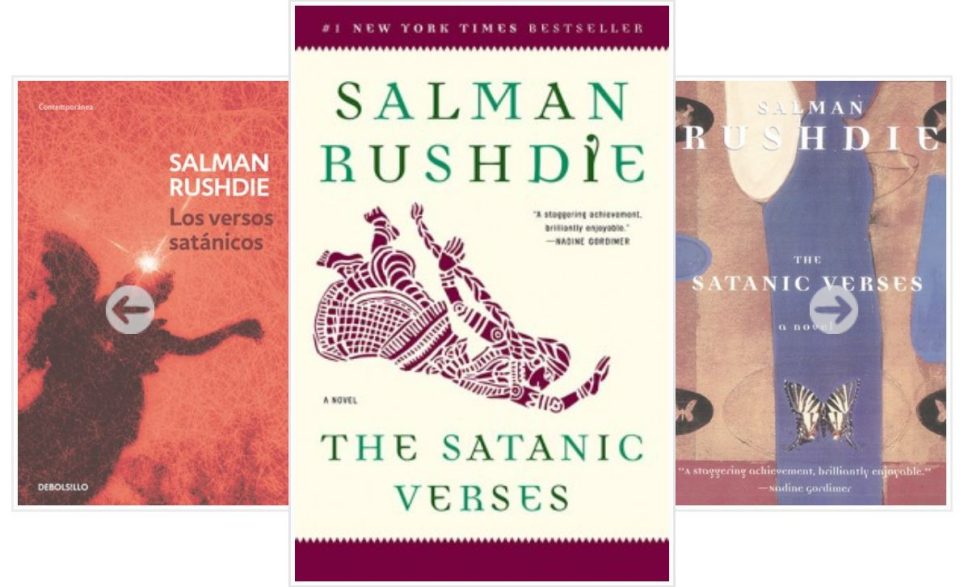
Salman Rushdie attack: Why his book The Satanic Verses created such a furore

Author Salman Rushdie was stabbed on stage at an event in New York on Friday (August 12). The Mumbai-born author had faced death threats for years for his book The Satanic Verses which won the Whitbread Prize for Best Novel.
The 75-year-old Rushdie is an author of several novels including Midnight’s Children which was awarded the Booker Prize in 1981. However, his fourth novel The Satanic Verses published in September 1988 courted controversy and was banned in India and several other countries.
The Satanic Verses forced him into hiding for nine years. A year after the book’s publication, Iran’s supreme leader Ayatollah Ruhollah Khomeini called for Rushdie’s execution for publishing the book for its blasphemous content.
Also read: Salman Rushdie on ventilator, may lose an eye, liver damaged: Report
Since the 1980s, Rushdie’s writing has led to death threats from Iran, which has offered a $3 million reward for anyone who kills him.
Controversy over The Satanic Verses
The author was not the only person to be threatened over the book’s content. The Japanese translator of The Satanic Verses was found dead at a university north-east of Tokyo in July 1991. Police said the translator, Hitoshi Igarashi, who worked an assistant professor of comparative culture, was stabbed several times and left in the hallway outside his office at Tsukuba University. His killer has never been found, according to a BBC website.
Earlier that same month, the Italian translator, Ettore Capriolo, was stabbed in his apartment in Milan, though he survived the attack. And the book’s Norwegian translator, William Nygaard, was shot in 1993 outside his home in Oslo – he also survived, it added.
What Rushdie said about ban
The Satanic Verses was banned by India four months before Khomeini issued a fatwa for his killing without any proper examination or a judicial process, Rushdie had written in his memoirs in 2012.

“The Satanic Verses was denied the ordinary life of a novel. It became something smaller and uglier: an insult. And he became the Insulter, not only in Muslim eyes but in the opinion of public at large,” Rushdie wrote in his memoirs ‘Joseph Anton’ on his hiding days after the fatwa.
Also read: Rushdie attack: Journalist on vacation was on the spot by chance
He said but for a few weeks in the fall of 1988 the book was still “only a novel” and he was still himself.
The book was then shortlisted for the Booker Prize along with novels by Peter Carey, Bruce Chatwin, Marina Warner, David Lodge and Penelope Fitzgerald.
“Then on Thursday, October 6th, 1988 his friend Salman Haidar, who was Deputy High Commissioner of India in London, called to tell him formally, on behalf of his government, that ‘The Satanic Verses’ had been banned in India,” he writes in a third person account. Haidar later became India’s Foreign Secretary.
“The book had not been examined by any properly authorised body, nor had there been any semblance of judicial process. The ban came, improbably, from the Finance Ministry, under Section 11 of the Customs Act, which prevented the book from being imported.
“Weirdly, the Finance Ministry stated that the ban ‘did not detract from the literary and artistic merit’ of his work. Thanks a lot, he thought,” Rushdie said.
The first death threat was received four days later on October 10 at the London office of his publisher Viking Penguin and the day after that, a scheduled reading in Cambridge was cancelled by the venue because it, too, had received threats, he added.
Former Union minister justifies ban
K Natwar Singh, who was a Union minister in the Rajiv Gandhi government that banned The Satanic Verses, strongly defended the decision on Saturday (August 13) asserting it was taken “purely” for law and order reasons.
Singh, who was the minister of state for external affairs when the book was banned in 1988, said he was part of the decision and had told the then prime minister the book could cause serious law and order problems as feelings were running very high.
Singh (91) rejected as “rubbish” the charge by critics the Rajiv Gandhi government’s decision to ban the book was driven by appeasement towards Muslims. “I don’t think it (the decision to ban the book) was wrong because you see it had led to law and order problems, particularly in Kashmir. In other parts of India also there was disquiet,” Singh told PTI.
“Rajiv Gandhi asked me what should be done. I said, ‘all my life I have been totally opposed to banning books but when it comes to law and order even a book of a great writer like Rushdie should be banned’,” the diplomat-turned-politician said.
Rushdie’s Midnight’s Children is one of the great novels of the 20th century but the decision to ban The Satanic Verses was taken purely for law and order reasons, Singh asserted.
Strongly defending the Rajiv’s government’s decision, Singh said, “I completely think it was justified because it was going to cause serious law and order problems as feelings were running very high particularly among our Muslim population.”
“I said, ‘the entire Muslim world is going to flare up, we have a large number of Muslims and apart from that, what the book contains at this time, is not acceptable’,” he recounted.
On Rushdie’s website, The Satanic Verses is described as “one of the most controversial and acclaimed novels ever written”, and is “Salman Rushdie’s best-known and most galvanizing book”.
Who is Rushdie?
Rushdie is a Fellow of the British Royal Society of Literature. Rushdie has received, among other honours, the Whitbread Prize for Best Novel (twice), the Writers’ Guild Award, the James Tait Black Prize, the European Union’s Aristeion Prize for Literature, Author of the Year Prizes in both Britain and Germany, the French Prix du Meilleur Livre Étranger, the Budapest Grand Prize for Literature, the Premio Grinzane Cavour in Italy, the Crossword Book Award in India, the Austrian State Prize for European Literature, the London International Writers’ Award, the James Joyce award of University College Dublin, the St Louis Literary Prize, the Carl Sandburg Prize of the Chicago Public Library, and a U.S. National Arts Award.
He holds honorary doctorates and fellowships at six European and six American universities, is an Honorary Professor in the Humanities at M.I.T, and University Distinguished Professor at Emory University. Currently, Rushdie is a Distinguished Writer in Residence at New York University.
He has received the Freedom of the City in Mexico City, Strasbourg and El Paso, and the Edgerton Prize of the American Civil Liberties Union. He holds the rank of Commandeur in the Ordre des Arts et des Lettres – France’s highest artistic honour. Between 2004 and 2006 he served as President of PEN American Center and for 10 years served as the Chairman of the PEN World Voices International Literary Festival, which he helped to create.
In June 2007 he received a Knighthood in the Queen’s Birthday Honours. In 2008 he became a member of the American Academy of Arts and Letters and was named a Library Lion of the New York Public Library. In addition, Midnight’s Children was named the Best of the Booker – the best winner in the award’s 40-year history – by a public vote.
His books have been translated into over 40 languages.
(With inputs from agencies)

